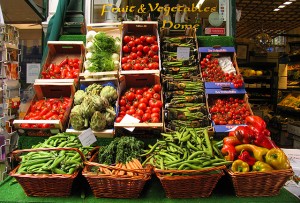
In my last post I wrote of some of my hesitations and concerns about the food movement. They where not major concerns but simple annoyances or critiques that I’d felt. The conversation that ensued was wonderful and I really appreciate those who took the time to reply to what I’d written and engage in some dialog. They were convincing arguments and I appreciated them. I’m willing, like I said before, to make changes in my families food choices. In thinking through it further, I recognized some values I have that seemed, at least in my head, to counter making changes in my food choices.
I think I’ve traditionally thought of food choices as being related to two specific values: personal health and environment. Eating healthy is a way to make choices for your immediate family to have better personal health and avoid the obesity epidemic and related disease. Eating organic and/or local is better for our environment, less pesticides, gas used on factory farming, shipping, etc. Oh, and third, free-range meat and eggs as an animal rights value. I know there’s more to it then that, but that would be the quick summary of how I’ve thought about the food choices.
I’ll try to keep these brief, but below are some of my values that I’ve found in conflict with making food choice changes.
Cost
Most of the ethical decisions I’ve made related to my lifestyle cost less money then the alternative. Biking rather then driving for example or sweatshop-made clothing for thrift store items. Rather then buy lots of fair trade chocolate instead of slave-made chocolate, I just rarely buy chocolate at all, it’s a luxury item after all. None of these things increase my costs. We can probably just chalk this up to being extremely frugal, or cheap, however you want to look at it. I think this is one of the reasons that I find the switch to more expensive food options as difficult, because unlike almost all my other ethical choices, it will consistently cost more.
Opportunity Cost
This is one of the main reasons that I’m consistently looking for ways to spend less money, the opportunity cost of that money to do good for others. I’ve previously used the example of the end scene in Schindler’s List when he recognizes his watch could have bought the safety of more Jews. The opportunity cost of the watch had significant value, people’s lives. I feel the same way when I think about what our finances could be going to. If I could spend $30 a month extra on organic foods to ensure the health of my immediate family or I could sponsor a child to ensure their provision through life, I’d probably go with the child everytime.
People First
I think, whether or not you believe in Global Warming, caring for the planet is an important factor in the decisions that we make. To a lesser degree, I think there is some merit to treating animals with care. However, the thing that vastly trumps those values in my ethical system is people. So, issues of slave labor, sweatshops and worker rights will win out over environmental concerns every time. And I know that they aren’t mutually exclusive, that environmental impact is often a direct cause of terrible working conditions, etc. It’s the human impact that will dictate my decisions far more then the effect on environment or animals.
I think that’s enough for now. The exercise above is not to make an argument against changing my food choices, but rather, laying them out so that those who are more well read on the subject can help point me in the right direction and help me walk through making changes to my families food choices.




 In recent months, I’ve been encouraged by others to think a bit more critically about my families food choices. I’ve since watched and read a bit and I find myself still a bit skeptical. If an outsiders generalization of my readers is correct, my skepticism regarding the popular food trends of local and organic might be a bit controversial to you reading. I’m hoping it is, because I’d like to get some feedback and thoughts on the topic and am quite open to having my views changed.
In recent months, I’ve been encouraged by others to think a bit more critically about my families food choices. I’ve since watched and read a bit and I find myself still a bit skeptical. If an outsiders generalization of my readers is correct, my skepticism regarding the popular food trends of local and organic might be a bit controversial to you reading. I’m hoping it is, because I’d like to get some feedback and thoughts on the topic and am quite open to having my views changed.